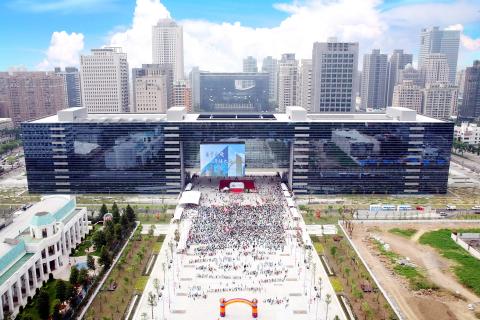Taichung last week became the nation’s second-largest city by population and as a growing city, it proves that the Forward-looking Infrastructure Development Program needs to be passed to support continued growth, Taichung-based Deputy Legislative Speaker Tsai Chi-chang (蔡其昌) said.
The Ministry of the Interior on Friday published its newest statistics, which showed that by the end of last month, Taichung’s population exceeded Kaohsiung’s by 309 residents, officially becoming the second-largest of the six special municipalities.
New Taipei City had the biggest population at 3.9 million, while Taichung and Kaohsiung both had about 2.7 million, Taipei came in fourth at 2.68 million, Taoyuan had 2.1 million and Tainan was the smallest, with 1.8 million inhabitants, according to official statistics.

Photo: Su Chin-feng, Taipei Times
The nation’s total recorded population was 23.55 million, an increase of 40,000 from last year, ministry data showed.
Tsai, a member of the Democratic Progressive Party (DPP), said that Taichung, long ignored in the national distribution of funds, spent longer coming into its own compared with Taipei and Kaohsiung.
The Forward-looking Program would give Taichung a chance to lead instead of remaining a forgotten rural backwater, he said.
Chinese Nationalist Party (KMT) Legislator Yan Kuan-heng (顏寬恒) said Taichung surpassing Kaohsiung was not a coincidence, as the city is home to both a seaport and an airport, and a decreasing crime rate adds to its appeal.
Local industries should ponder how to attract investment and create jobs, and both the municipal and the national government must give attention to falling birth rates if they wish to be “forward looking,” Yan said.
The establishment of special municipalities in 2010 was not the only impetus for Taichung’s growth; the policies of subsequent mayors also played a great role, Yan said.
Kaohsiung, the former second-largest municipality, should give due thought to what Taichung did right, he added.
Meanwhile, DPP Legislator Chao Tien-lin (趙天麟), whose constituency is in Kaohsiung, congratulated Taichung, but said his city’s residents would undoubtedly have experienced mixed emotions upon hearing the news.
Kaohsiung’s failure to change its industry mix from petrochemical factories to new technology and science parks directly contributed to the city developing more slowly over the past four decades, despite an initial population advantage, Chao said.
Chao added that Taichung had seen a more balanced development, whereas in recent years, the population in Kaohsiung’s Fengshan District (鳳山) increased by 40,000, whereas the former city center’s population, as well as that in Gangshan (岡山) and Cishan (旗山) districts had declined.
Industry and urban development should be given equal weight in the debate about Kaohsiung’s future, he said.
KMT Legislator Chen Yi-min (陳宜民), who represents another Kaohsiung constituency, said the city’s relative stagnation was hardly a shock.
A city’s competitive edge is maintained by creating an atmosphere of a city on the rise, he said.
Kaohsiung Mayor Chen Chu (陳菊) is hardworking, but judging by the city’s modest population increase over the past 11 years, net decrease over the past two years and net emigration, other city mayors had outperformed her, he said.
Chen Yi-min also pointed to a failure to shift away from petrochemical industries as the main reason for Kaohsiung’s stagnancy.
The gradual phasing out of the petrochemical cluster and lack of new businesses means a net decrease of jobs and a decreased ability to retain students that have come to Kaohsiung to study, and does not encourage former Kaohsiung residents to return, Chen Yi-min said.

The brilliant blue waters, thick foliage and bucolic atmosphere on this seemingly idyllic archipelago deep in the Pacific Ocean belie the key role it now plays in a titanic geopolitical struggle. Palau is again on the front line as China, and the US and its allies prepare their forces in an intensifying contest for control over the Asia-Pacific region. The democratic nation of just 17,000 people hosts US-controlled airstrips and soon-to-be-completed radar installations that the US military describes as “critical” to monitoring vast swathes of water and airspace. It is also a key piece of the second island chain, a string of

A magnitude 5.9 earthquake that struck about 33km off the coast of Hualien City was the "main shock" in a series of quakes in the area, with aftershocks expected over the next three days, the Central Weather Administration (CWA) said yesterday. Prior to the magnitude 5.9 quake shaking most of Taiwan at 6:53pm yesterday, six other earthquakes stronger than a magnitude of 4, starting with a magnitude 5.5 quake at 6:09pm, occurred in the area. CWA Seismological Center Director Wu Chien-fu (吳健富) confirmed that the quakes were all part of the same series and that the magnitude 5.5 temblor was

The Central Weather Administration has issued a heat alert for southeastern Taiwan, warning of temperatures as high as 36°C today, while alerting some coastal areas of strong winds later in the day. Kaohsiung’s Neimen District (內門) and Pingtung County’s Neipu Township (內埔) are under an orange heat alert, which warns of temperatures as high as 36°C for three consecutive days, the CWA said, citing southwest winds. The heat would also extend to Tainan’s Nansi (楠西) and Yujing (玉井) districts, as well as Pingtung’s Gaoshu (高樹), Yanpu (鹽埔) and Majia (瑪家) townships, it said, forecasting highs of up to 36°C in those areas

IN FULL SWING: Recall drives against lawmakers in Hualien, Taoyuan and Hsinchu have reached the second-stage threshold, the campaigners said Campaigners in a recall petition against Chinese Nationalist Party (KMT) Legislator Yen Kuan-heng (顏寬恒) in Taichung yesterday said their signature target is within sight, and that they need a big push to collect about 500 more signatures from locals to reach the second-stage threshold. Recall campaigns against KMT lawmakers Johnny Chiang (江啟臣), Yang Chiung-ying (楊瓊瓔) and Lo Ting-wei (羅廷瑋) are also close to the 10 percent threshold, and campaigners are mounting a final push this week. They need about 800 signatures against Chiang and about 2,000 against Yang. Campaigners seeking to recall Lo said they had reached the threshold figure over the